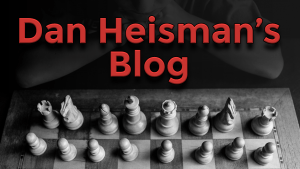Q&A with Coach Heisman Apr 18, 2014
In life, improvement is usually achieved by proceeding along the triangle "->Learn->Practice->Test->". In chess, this is "->Study->Play->Get Feedback->". Leave something out of the loop and you get diminishing returns.
This was the key part of the answer to the question:
"I'm 1300 and improving by mostly playing games. When do I need to get serious and put in some study to keep improving?"
I discuss aspects of this in many of my columns (each is a live link):
- My Top Tips for Chess Improvement
- An Improvement Plan (greatly updated in my book A Guide to Chess Improvement)
- The Four Homeworks
- The Improvement Feedback Loop
- The Theory of Chess Improvement
Someone told me that a Chess.com member was posting somewhere on the site that I dislike the Caro-Kann. I don't dislike the Caro-Kann; it's one of the most respected openings, played by World Champions. But I do like to have some fun with the Caro-Kann, consistently using it in examples of, say, how memorizing openings is not the way to go, e.g.
- "If a 1400 player took a pill that allowed him to memorize a book on the Caro-Kann, how many rating points would his playing strength improve?" (the most common guesses are 20-50 points although occasionally someone guesses less and rarely more)
- The rating system predicts a 1600 player should win 91% of the points vs a 1200 player. "If a 1600 player loved the Sicilian and was playing a match against a 1200 player but we made him play the Caro-Kann instead - which he doesn't know - what percentage of the points would he win then?" (probably about 88-90%; those who guess 60% would be saying that just changing the opening in half his games [the ones with Black where he can play the Caro-Kann] would make a 1600 player a 1270 player, since a 1270 beats a 1200 about 60%. That's clearly way too much affect)
So I guess you could say I have a "fun" relationship with the Caro-Kann, but I clearly don't dislike it. In fact, I played it for a while (but not too long!).
"What opening repertoire should I choose if I don't want to learn a lot of book moves?"
I get this question occasionally and my first thought is:
The better an opening the more popular it is, and thus it usually has more book lines.
However, some openings are less "trappy", so extensive book knowledge is not as required. In today's show I recommended to the questioner:
- The London Systemfor White: not very trappy; only two major books on it),
and - The Modern System as Black: fun to play, very transpositional, but you don't need to know as much book since 1...g6 can be played against both 1.e4 and 1.d4, thus obviating the need to study an opening against both moves.
It's no coincidence that both these suggestions are Systems and not just openings. If you don't know the difference, I strongly suggest you check out Openings vs Opening Systems (that's a link).
"We don't need to go over that game. I know why I lost; I left my queen en prise to a bishop because I didn't see the bishop."
This wasn't a question on the show but it was sparked by one. When I hear this, my reaction is always:
"You get more out of eliminating your large errors than you do your small errors. And if you don't know exactly why you didn't see that bishop, you are probably doomed to keep losing your queen that way more than you should."
What are the most common reasons one "...didn't see the bishop?":
- Poor board vision - looked but literally could not see the bishop on the other side of the board.
- Played Hope Chess - did not ask about the candidate move "If I make that move, what are all the dangerous checks, captures, and threats my opponent can do in reply, and can I meet them?", and/or
- Played too fast - made the move that lost the queen so fast that they did not have time to check to see if the move was safe.
So there's a big difference between "I didn't see the bishop over there" and "I wasn't even trying to see if there was a bishop over there"! 
"What's the most important part of the game (or part to study, etc): opening, middlegame, or endgame?"
I get this question occasionally. Interestingly, one could make a strong argument for any of the three!:
- Opening - the only part of the game you are guaranteed to reach every game. Also, getting a good opening always proves a psychological boost (at least til your middlegame mistakes...)
- Middlegame - the most complicated part of the game. The one where tactics and strategy are most rich and complex.
- Endgame - The part of the game where you can't possibly get away with Hand-Waving; instead careful analysis is always required. In the endgame it's very easy to make a mistake that turns a won position into a drawn or even lost one. To make things worse, a mistake in the endgame often means there's no "later" to reverse the tide.
 "(this paperback is also available in Forward Chess format for mobile devices)
"(this paperback is also available in Forward Chess format for mobile devices)Lots of great questions from the viewers this week, thanks! Thanks to them, if you read this article plus the content at all the links and didn't learn a thing or two or three, that would be very surprising.  Cya next time!
Cya next time!






